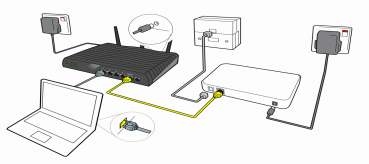Wi-Fi vs. Wired: Which Connection Offers Better Internet Speed?

One of the most common debates among internet users is whether Wi-Fi or a wired connection provides better speed and stability. In this blog post, we'll dive into the key differences between Wi-Fi and wired connections, exploring which option might offer better internet speed based on your needs. By the end, you’ll have a clearer idea of which setup works best for you, depending on your internet habits, environment, and devices.
What’s the Difference Between Wi-Fi and Wired Internet?
Before we compare their speeds, let’s quickly go over what Wi-Fi and wired internet are:
Wi-Fi is a wireless technology that allows devices like smartphones, tablets, and laptops to connect to the internet without physical cables. It uses radio waves to send data between your device and your router.
Wired internet, on the other hand, refers to a physical connection—typically using Ethernet cables—between your device and your internet router. This direct link is often considered the more stable option.
Wi-Fi: Convenience Over Speed?
Wi-Fi has revolutionized how we access the internet, making it incredibly convenient to connect multiple devices in different rooms without dealing with the clutter of wires. However, the convenience comes at a cost: speed and reliability.
Factors That Can Affect Wi-Fi Speed
Distance from the Router: The farther you are from your router, the weaker your signal will be, which can result in slower speeds.
Interference: Wi-Fi signals can be disrupted by walls, floors, and other electronic devices, such as microwaves or baby monitors. This interference can cause a drop in speed and connection quality.
Bandwidth Sharing: Since Wi-Fi networks share bandwidth among all connected devices, the more devices you have using the internet, the slower it can get. For example, if one family member is streaming a movie while another is gaming, your speeds can slow down.
Want to know your current Wi-Fi speed? Use this speed test tool to check how fast your connection is.
When Wi-Fi Works Best
Wi-Fi is ideal for mobile devices or when you're in a part of your home where running an Ethernet cable isn’t practical. It’s perfect for casual browsing, streaming on handheld devices, and basic tasks. However, if you’re looking for consistent high-speed performance, Wi-Fi can fall short, especially in larger households or busy networks.
Wired Internet: Speed and Stability
Wired internet connections generally offer faster, more reliable speeds than Wi-Fi. By plugging your device directly into the router using an Ethernet cable, you eliminate many of the factors that can cause Wi-Fi to slow down, such as interference or distance from the router.
Advantages of Wired Internet
Faster Speeds: Ethernet cables can handle much higher data transfer rates than Wi-Fi, which often translates to faster download and upload speeds.
Low Latency: Latency, or lag, is significantly lower with wired connections. This is especially important for activities like gaming or video conferencing, where real-time data transfer is crucial.
More Stable Connection: A direct connection via Ethernet provides consistent speeds and minimizes drops or fluctuations, making it more reliable for heavy internet usage.
For users who require the most reliable connection possible, like gamers or those who work from home with large file uploads, a wired connection might be the better choice. To ensure you’re selecting the best high-speed internet plans for your wired needs, check out this guide.
When Wired Internet Works Best
If you're streaming in 4K, gaming, or doing anything that requires a high level of speed and consistency, wired internet is the way to go. It’s also great for smart TVs, gaming consoles, and desktop computers where mobility isn’t a concern.
How to Choose Between Wi-Fi and Wired Internet
The best choice between Wi-Fi and wired connections largely depends on your individual needs, the number of devices in your home, and the size of your living space. Here’s a quick breakdown to help you decide:
Choose Wi-Fi If:
- You need flexibility and mobility around your home.
- You have multiple mobile devices that need to connect.
- Your internet activities mainly involve web browsing, social media, and video streaming in standard definition.
Choose Wired If:
- You require faster, more stable speeds for gaming, video conferencing, or HD streaming.
- You have a large household with multiple devices simultaneously using the internet.
- You want to avoid lag and latency during activities that require real-time communication, such as online gaming.
Optimize Your Internet Setup
If you're using Wi-Fi and notice slower speeds, there are steps you can take to optimize your connection. Moving your router to a central location, reducing interference, or upgrading to a faster router can help. You can also check how much internet speed you need for your specific activities using this internet speed needs calculator.
Additionally, choosing the right internet speed plan is crucial to meet your household’s needs. If you’re unsure which internet plan is right for you, consider reading this guide on matching your internet speed to your needs.
Hybrid Solutions: The Best of Both Worlds?
You don’t necessarily have to choose between Wi-Fi and wired connections exclusively. Many households benefit from a hybrid approach, using Wi-Fi for mobile devices like smartphones and tablets, while relying on Ethernet cables for devices that demand faster and more stable connections, like gaming consoles or desktop PCs.
Conclusion: Which One is Right for You?
Ultimately, the decision between Wi-Fi and wired internet depends on what you prioritize—convenience or performance. Wi-Fi gives you the flexibility to roam freely around your home, but it may not offer the same speed and stability as a wired connection. Wired internet, while less flexible, is ideal for users who need fast, reliable speeds for demanding tasks like gaming, video streaming, and working from home.
Whether you choose Wi-Fi, wired, or a combination of both, knowing your household’s internet needs will help you make the best decision. To stay informed on the latest in internet services and how to maximize your connectivity, check out this guide on boosting your connectivity.
By understanding the strengths and limitations of both Wi-Fi and wired connections, you can set up an internet solution that ensures you get the best possible speed and reliability for your specific needs.
Related Posts

Tue, Mar 20, 2018 12:18 AM
Broadband Deals Money SubscriptionHow Much You Are Pay Per Minute For Your Streaming
Are we happy paying subscriptions?

Tue, Mar 20, 2018 12:44 AM
Technology Broadband InstallationInternet Provider Installation FAQs
Guide to Internet Provider Installation

Thu, Jul 16, 2020 8:54 PM
Internet BundlesAT&T Business Internet: Things You Need To Know! Complete Guide
Updated: AT&T business internet is one way to get your company connected fast. If you want to go with AT&T, consider what plan you need the most, and decide what is best for you.

Tue, Jan 21, 2020 4:50 PM
Technology5G mobile phones to look out this 2020
5G phones to look out

Tue, Apr 14, 2020 9:22 PM
WifiWhy Is My Internet Speed Slower Than My Internet Plan?
Are you getting the right internet speed provider advertised? Let's say, your paying 500Mbs but according to speed test, you are only getting roughly 50-90Mbs. You contacted your Internet Services Provider and they told you that "You have a slow computer". Well, maybe yes or no, the internet service provider has an incentive to be as optimistic as possible. Deals and offers are sometimes misleading.